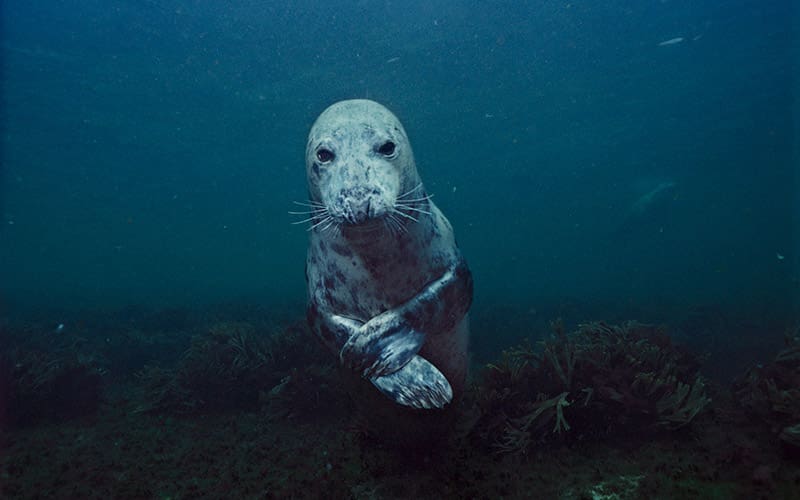
Dr. Casey Thornbrugh believes that the Ocean is a sacred space tied to his tribe's identity as the People of the First Light. Photo: Brian Skerry
Dr. Casey Thornbrugh is an environmental advocate with a doctorate in geography and a unique perspective as a citizen of the Mashpee Wampanoag Tribe. Thornbrugh co-founded Just Collective, a small consulting firm that supports ethical community engagement and climate resiliency for communities. Through his consulting firm, he has helped CLF better understand Indigenous perspectives on our work.
What inspired you to work for the environment?
As an Indigenous person, I understand the environment to be a place where I, my ancestors, my Tribal community, my children, and my descendants are connected. We say, “We are the land, and the land is us.” The environment holds the plants, animals, waters, landscapes, and seascapes that are unique to a specific place and, therefore, our connection with local environments also makes each Indigenous culture and nation unique.
As a Wampanoag, southeastern Massachusetts, Cape Cod, and the Islands have an environment like nowhere else on the planet, and our 12,000-year-old culture evolved with it. I believe many of our Tribal citizens feel a deep sense of responsibility to care for and steward the environment. I am very much inspired to work for the environment because our cultural, mental, and spiritual health are directly tied to the health of the environment.
You’ve shared your expertise with CLF’s Ocean Conservation team. What drew you to advocate for the ocean in particular?
I am a citizen of a coastal Tribal Nation, the Mashpee Wampanoag Tribe. Just as we are connected to the land, we are connected to the Ocean. The Ocean is a sacred space tied to our identity as the People of the First Light. The Ocean is where we get much of our food. Its waters provide moisture for the atmosphere, for rain and snow, both locally and throughout the world. It is a place where life on Earth began. The Ocean therefore deserves our utmost respect, almost like how you should respect your mother or caretaker.
A lot of environmental work and protection occurs on land because this is where people live. Environmental damage can be more easily seen. However, I fear the ocean is neglected, over-harvested, and is a dumping ground with an out-of-sight, out-of-mind mentality. For these reasons, it is essential to advocate for the Ocean.
What can the broader environmental movement learn from Tribal Nations and Indigenous communities’ relationship to and advocacy for the environment?
The key word is “relationship.” We need to have strong, positive, and reciprocal relationships with the environment. Tribal Nations and Indigenous communities have lived with our environments for thousands of years, and through choices we make, we are trying to ensure we can continue to live with the environments of our homelands for another thousand years.
The broader environmental movement can learn from a couple principles for relating to and advocating for the environment, such as humility and responsibility. Humility, in that humans are not above and should not try to control the environment but should make their best efforts to live in sync with it. Responsibility, in understanding that humans have respective responsibilities to the environment from which we are from, or for those environments for which we live. These responsibilities include stewardship, taking only what is needed, and not over-taxing it. It also means being mindful of commodities from other environments and globalization, or in other words being mindful to avoid reliance on goods and materials that devastate environments far away.
Tribal Nations and Indigenous communities should always have a leadership role in environmental advocacy, as Indigenous peoples are not merely “stakeholders,” we are “rights holders.” We have the right to healthy environments from which to continue our communities and our cultures.
What should be the biggest ocean conservation priorities in the coming years?
Protection of unique ocean and coastal habitats from the impacts of a changing climate and increased ocean acidification. The protection of unique marine environments, estuaries, and river systems will help make the Ocean and its beings (i.e., marine life) more resilient to the inevitable climate changes such as a warming ocean, altered currents, and changes to ocean chemistry.
The Mashpee Wampanoag Tribe has a long history of protecting their natural environment and cultural heritage. Can you share more about that work?
The Mashpee Wampanoag Tribe has been protecting our natural environment and cultural heritage since time immemorial. We have done this pre-contact in order to continue existing in the environment for thousands of years. Then after contact with European settlers we had to fight very hard to protect our natural environment and cultural heritage over a shrinking land tenure. Our lands went from 60 square miles in the 17th century, to 25 square miles in the 18th and early 19th centuries, to 8 square miles in the late 19th century to less than a square mile today.
Nevertheless, we assume hunting, fishing, and gathering rights over usual and accustomed places throughout our original homelands and seascapes, and work to ensure the environmental health of these areas. This means our Tribal Nation and its natural environment and cultural heritage efforts must occur with some degree of coordination with local, municipal, state, and federal departments and agencies. Some very specific examples are working with local, state, and federal agencies to improve water quality and fish passage in our homelands.
Bonus: You’ve previously worked as a college science and geography instructor. What do you wish more people knew about the environment?
I wish more people understood how interconnected the environment is. When one species is harmed or eliminated from the environment, there are consequential effects on other species and on the human communities that depend on these species for sustenance and culture. I wish more people were aware of the traditional knowledge of Indigenous cultures and societies and that this knowledge is the reason Indigenous Nations should be leaders and decision-makers in environmental protection, conservation, and advocacy.
For more information on Dr. Casey Thornbrugh’s work, please visit www.justcollective.net.



